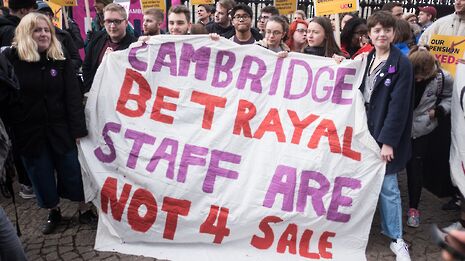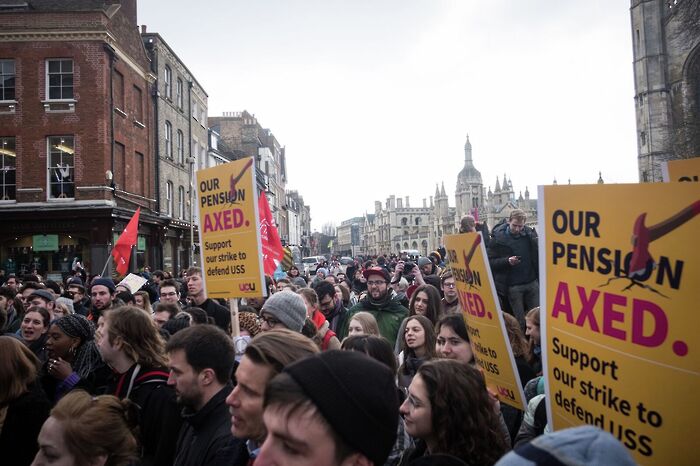Students call for University to reimburse cancelled teaching amid staff strikes
A petition is calling for a £300 reimbursement per student for lost contact hours

With the University and College Union strikes underway, some students have called for the University to reimburse them for teaching affected by strike action.
A petition was created by student Tamara Brian at Gonville & Caius demanding that the University reimburse every student with £300 for lost contact hours. The petition, which has reached over 600 signatures, comes as some students voice concerns over the strike’s disproportionate impact on international and MPhil students.
Students and staff participating in and supporting strike action today expressed mixed views on the petition. One student at the CUSU rally told Varsity that the petition was “putting [students] in a position of a consumer of a product.” On the other hand, an undergraduate at King’s, Cecily Bateman, was supportive of “any kind of action that brings publicity that takes [the strike action] to the highest level”.
In a closed meeting on Wednesday, Cambridge University Labour Club passed a motion against students petitioning for refunded contact hours. Many UCU picketers, however, told Varsity that they were largely supportive of demands for the University to reimburse students.
Cambridge Universities and Colleges Union (UCU) Branch Secretary Dr. Waseem Yaqoob added that “students should press for an end to the disruption any way they see fit”, noting, however, that the UCU would prefer that students “call for negotiations above all”.
At a student rally organised on Thursday afternoon, CUSU Women's Officer Lola Olufemi spoke against calling for reimbursement. She said: the “language of marketisation is based on the language of the self”. She urged students to ask why they themselves are seeing their education inconvenienced when those who educate them are “about to face huge pay cuts.” She then called for a fight for “free education.”
The short duration of courses for MPhil students and higher fees charged to international students means that frustration surrounding cancelled teaching runs especially high among these groups.
Callum Hale-Thomson, an English MPhil student, told Varsity that he already has relatively little contact time – his course is only nine months long and has twelve 90-minute seminars per term. As a result, it is “a crucial time both for coursework essays and the start of our dissertation projects, so the strikes have caused some real disruption.”
He added, “We’ve received almost no communication from [the University], and it’s unacceptable that their unwillingness to compromise or engage has resulted in such disruption to our already time-strapped courses.”
Concerns have also been raised that non-EU international students, who pay much higher fees than EU and UK students, are shouldering an unfair financial burden as a result of the strike.
Chair of CUSU International Committee Leo Paillard told Varsity: “As international students from outside of the EU pay fees corresponding exactly to the cost of their course, the effect of the strike in terms of cancelled lectures and supervisions is obviously felt more strongly by them.”
International undergraduates from outside the EU pay annual tuition fees between £19,197 and £29,217; the costs are dependent on the student’s chosen subject. Notably, international students studying medicine pay significantly higher annual tuition fees of £50,130. In addition to their tuition fees, international students must also pay annual College fees of between £6,850 and £12,700, which cover domestic, educational and pastoral support.
Speaking to Varsity, an anonymous international student expressed her frustration over both the conditions that forced staff to strike and its financial cost: “As an international student paying extortionate fees, I find it disgusting that the staff have been driven to this necessity, and if possible will be contacting the university for reimbursement.”
She added: “Some might say that this is only further enforcing the marketization of our education, but lamentably that is the system we live in to me this seems like a rational way to put pressure on the University.”
UCU plans to meet on Friday 2nd March to discuss universities’ response to the first wave of strikes. According to UCU General Secretary Sally Hunt, the union will “urge vice-chancellors to put pressure on Universities UK to get back round the table”.
 News / Judge Business School advisor resigns over Epstein and Andrew links18 February 2026
News / Judge Business School advisor resigns over Epstein and Andrew links18 February 2026 News / Gov grants £36m to Cambridge supercomputer17 February 2026
News / Gov grants £36m to Cambridge supercomputer17 February 2026 News / Hundreds of Cambridge academics demand vote on fate of vet course20 February 2026
News / Hundreds of Cambridge academics demand vote on fate of vet course20 February 2026 News / CUCA members attend Reform rally in London20 February 2026
News / CUCA members attend Reform rally in London20 February 2026 News / Union speakers condemn ‘hateful’ Katie Hopkins speech14 February 2026
News / Union speakers condemn ‘hateful’ Katie Hopkins speech14 February 2026











